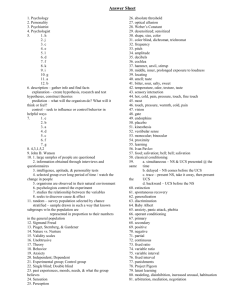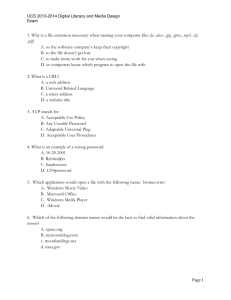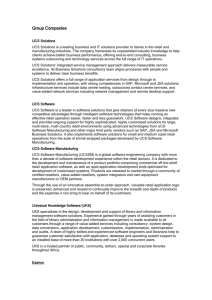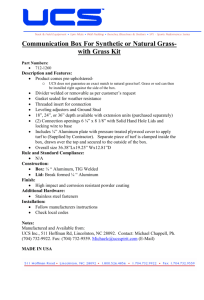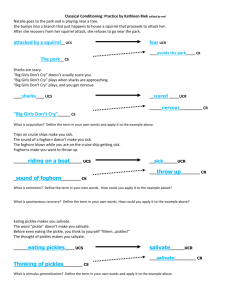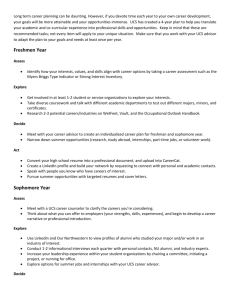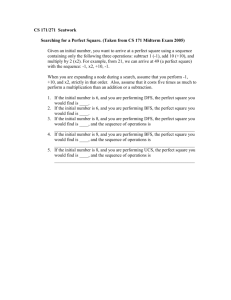Chapter B1: Programme design and approval
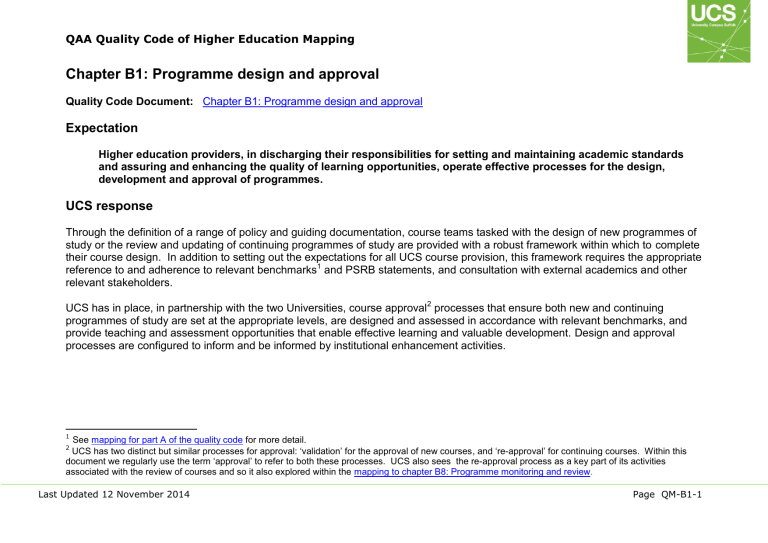
QAA Quality Code of Higher Education Mapping
Chapter B1: Programme design and approval
Quality Code Document: Chapter B1: Programme design and approval
Expectation
Higher education providers, in discharging their responsibilities for setting and maintaining academic standards and assuring and enhancing the quality of learning opportunities, operate effective processes for the design, development and approval of programmes.
UCS response
Through the definition of a range of policy and guiding documentation, course teams tasked with the design of new programmes of study or the review and updating of continuing programmes of study are provided with a robust framework within which to complete their course design. In addition to setting out the expectations for all UCS course provision, this framework requires the appropriate reference to and adherence to relevant benchmarks
1
and PSRB statements, and consultation with external academics and other relevant stakeholders.
UCS has in place, in partnership with the two Universities, course approval
2
processes that ensure both new and continuing programmes of study are set at the appropriate levels, are designed and assessed in accordance with relevant benchmarks, and provide teaching and assessment opportunities that enable effective learning and valuable development. Design and approval processes are configured to inform and be informed by institutional enhancement activities.
1
2
See mapping for part A of the quality code for more detail.
UCS has two distinct but similar processes for approval: ‘validation’ for the approval of new courses, and ‘re-approval’ for continuing courses. Within this document we regularly use the term ‘approval’ to refer to both these processes. UCS also sees the re-approval process as a key part of its activities associated with the review of courses and so it also explored within the mapping to chapter B8: Programme monitoring and review .
Last Updated 12 November 2014 Page QM-B1-1
Chapter B1: Programme design and approval
Indicators How UCS addresses the Indicator
1. Higher education providers maintain strategic oversight of the processes for, and outcomes of, programme design, development and approval, to ensure processes are applied systematically and operated consistently.
Processes for the approval of courses are set out in the Partnerships Handbook and agreed in partnership with the validating universities who retain overall authority for approval. Early stages of the approval process enable checking of
, proposals against institutional strategies, resourcing and aspirations, whilst later stages are focused on the academic integrity of proposed provision.
Further Internal Documentary Evidence:
Overall institutional oversight of course design and approval processes is held by Academic Board , ensuring that activities within the two faculties and learning network are brought together at institutional level. Academic board receives reports on validation event outcomes, along with minutes from relevant subcommittees, to enable it to consider the effectiveness and consistency of course design and approval processes.
Academic Board Minutes and Papers
Annual Academic Report
On-going enhancement and improvement activities
Last Updated 12 November 2014 Page QM-B1-2
Chapter B1: Programme design and approval
Indicators
2. Higher education providers make clear the criteria against which programme proposals are assessed in the programme approval process.
How UCS addresses the Indicator
Early stages of new course approval processes enable the inspection of course proposals in the context of institutional strategies, resourcing plans, and the wider context within which the institution operates. The Portfolio Development Committee has specific responsibility to ensure that appropriate costing models are in place to justify new course developments and that resource implications have been fully and effectively considered.
As set out in the Partnerships Handbook , the validation process ensures that proposed provision is pitched at appropriate academic levels, aligned with external reference points, and complies with institutional frameworks, policies and regulations. UCS credit structures, definitions of the requirements and constraints governing course design, are set out within frameworks provided for foundation degrees, other undergraduate courses, and postgraduate taught provision. Similarly, UCS policies such as those on tutorial provision , student attendance , student discipline , and assessment regulations, further restrain course design to meet UCS expectations. The UCS ‘ Teaching and
Learning’ and ‘ Assessment and Feedback’ strategies also provide guidance and parameters informing the course design processes.
On-going enhancement and improvement activities
Further Internal Documentary Evidence:
In liaison with the validating universities, UCS employs a detailed description of the issues and areas of exploration that should form the basis for approval panel’s discussions and decisions. These are recorded within the appendices of the
Partnerships Handbook and provided to all approval panel members prior to their events.
Portfolio Development Committee Terms of reference, Minutes and Papers
Validation event reports
Last Updated 12 November 2014 Page QM-B1-3
Chapter B1: Programme design and approval
Indicators
3. Higher education providers define processes, roles and responsibilities for programme design, development and approval and communicate them to those involved.
Further Internal Documentary Evidence:
How UCS addresses the Indicator
All UCS course approval processes are documented through the Partnerships
Handbook.
This documentation is supplemented by further guidance documents and document templates. All teams seeking to engage with approval processes are offered staff development input from the Quality Assurance and Enhancement team along with on-going support and advice both leading up to and beyond the actual event.
Internal support documentation exploring validation and approval processes.
Approval documentation templates
Records of supporting interactions and staff development between course teams and the office of academic development.
On-going enhancement and improvement activities
4. Higher education providers evaluate their processes for programme design, development and approval and take action to improve them where necessary.
Further Internal Documentary Evidence:
Periodically, in partnership with the Universities, the approval processes are evaluated to inform proposals for development and enhancement. The Partnerships
Management Group reviews the Partnerships Handbook annually to ensure it reflects current practice and policies and to enable the refinement and enhancement of processes.
Successive versions of the Partnerships Handbook
PMG minutes
Additional Guidance was introduced in the 2013-
14 Partnerships
Handbook to enable the approval of on-line provision. This will be reviewed in the light of its application during the
2013-14 academic year.
Last Updated 12 November 2014 Page QM-B1-4
Chapter B1: Programme design and approval
Indicators
5. Higher education providers make use of reference points and expertise from outside the programme in programme design and in their processes for programme development and approval.
How UCS addresses the Indicator
All courses proposed for validation are required to make explicit in their documentation how they are aligned with the various national reference points as set out in Part A of the Quality Code , and validation panels are required to assure themselves that the alignment presented is valid, complete and appropriate.
On-going enhancement and improvement activities
Further Internal Documentary Evidence:
In addition to the input proffered by or sought from the validating universities, course design processes expect those involved to consult with external academics and other relevant external stakeholders (for example, PSRBs , employers, or community representatives) as well as working with internal departments such as student support , library and learning resources, learning technologists, and the quality assurance and enhancement team. The approval processes require both external academic and a relevant external industrial, commercial, professional, or community representative to be full members of approval panels.
Validation and re-approval documents
Records of approval events
Guidance notes for course teams preparing for approval events
6. Higher education providers involve students in programme design and in processes for programme development and approval.
Course teams are expected to consult with students during course design and review processes in preparation for validations and reapproval.
Approval event panels usually include a student as a full member and are provided with an opportunity to explore the course’s provision with a group of current students during the event.
Further Internal Documentary Evidence:
Course teams proposing changes to provision are required to consult with students in preparing proposals for approval.
Examples of student consultation during course design and self-evaluation processes during preparation for re-approval events.
Re-approval event reports.
Evidence of student consultation on Course Change (CAT3) forms.
Last Updated 12 November 2014 Page QM-B1-5
Chapter B1: Programme design and approval
Indicators How UCS addresses the Indicator
7. Higher education providers enable staff and other participants to contribute effectively to programme design, development and approval by putting in place appropriate arrangements for their support and development.
Further Internal Documentary Evidence:
All UCS course approval processes are documented through the
Partnerships Handbook. This documentation is supplemented by further guidance documents and document templates. All teams seeking to engage with approval processes are offered staff development input from the Quality Assurance and Enhancement team along with on-going support and advice both leading up to and beyond the actual event.
Internal support documentation exploring validation and approval processes.
Approval documentation templates
Records of attendance at relevant CPD sessions
Records of interventions from the Quality Assurance and
Enhancement team
On-going enhancement and improvement activities
Monitoring and Review
Responsibility for the monitoring of this mapping lies with the Academic Board.
Last Updated 12 November 2014 Page QM-B1-6
